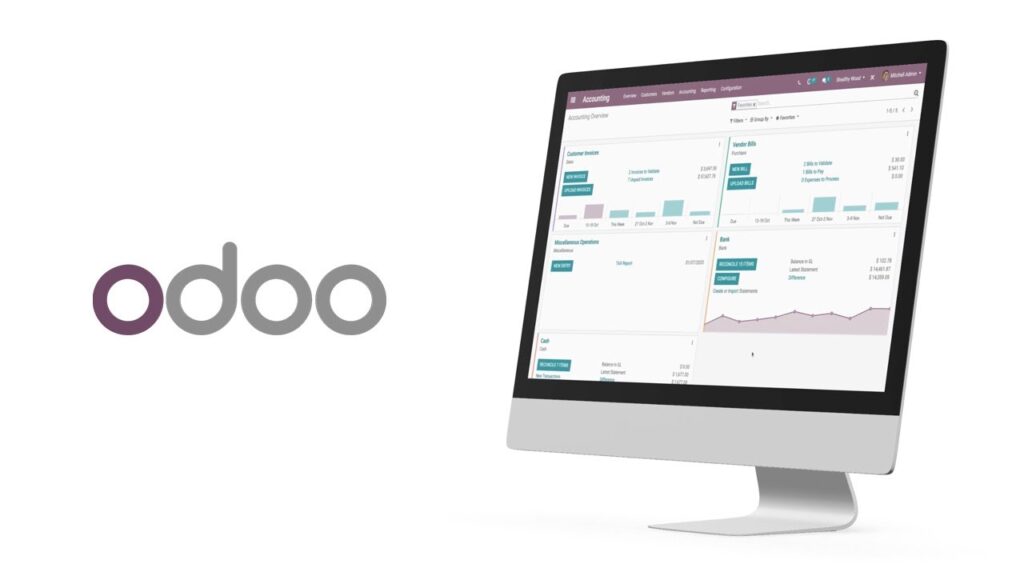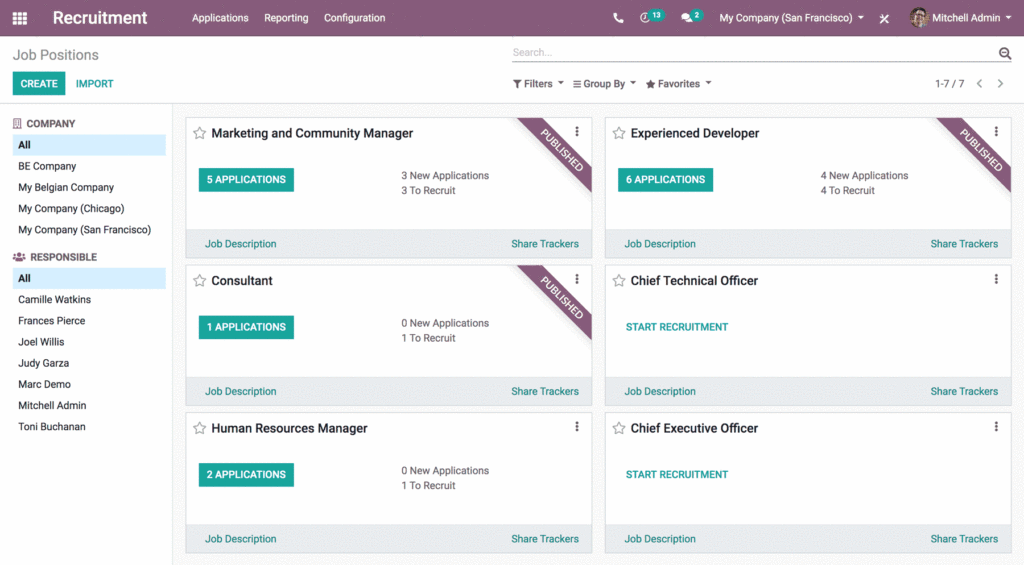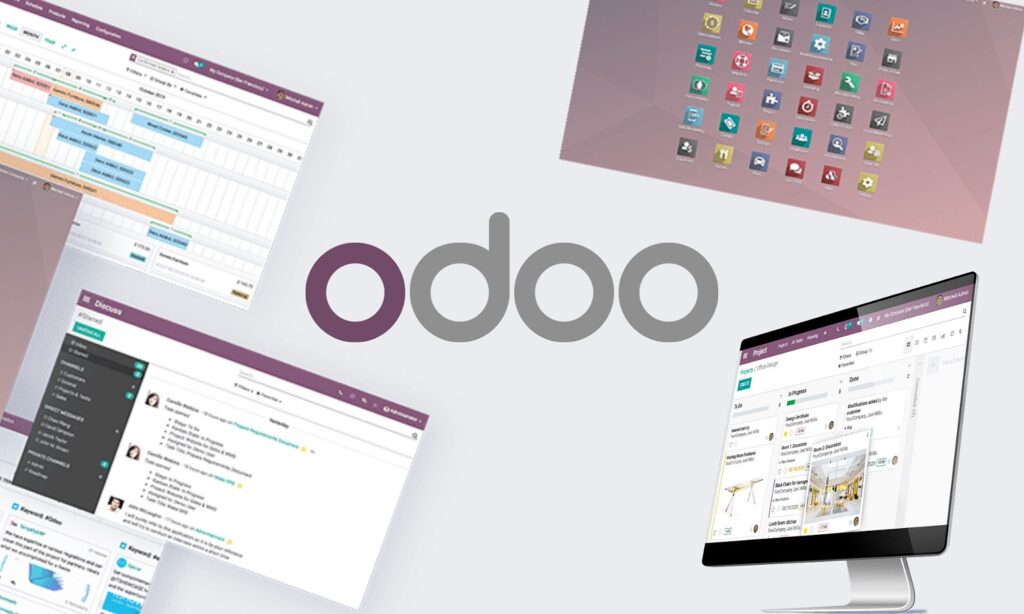As a business grows, new challenges emerge, such as accounting data management, such as invoices, payments, taxes, payment terms, expenses, and so on.
Poor accounting management can lead to massive losses for your company.
However, using Odoo ERP QuickBooks integration is the best way to provide users with dependable, efficient, and cost-effective operations.
This article will go over Odoo QuickBooks Integration for seamless accounting and bookkeeping management.
What is Odoo?
Odoo is a suite of open-source business apps that have been fully integrated into powerful and customizable management software that can handle a wide range of business needs.
It enables you to manage all aspects of an organization’s accounting in an ergonomic, user-friendly, modern, and appealing interface.
Odoo is used by over 7,000,000 people worldwide, ranging from startups to large corporations.
What is QuickBooks?
QuickBooks is a full-featured business and financial management suite that includes tools for accounting, inventory, payroll, tax filing, invoicing, bank account tracking and reconciliation, expense management, budgeting, payment processing, and accounts receivable and payable management.
This software is widely used by small and medium-sized businesses. It controls more than 80% of the small business market in the United States.
Benefits of Quickbooks for Small and Medium-Sized Businesses
If your company’s spreadsheets have grown and you want to transition from manual to digital accounting, or if you need a better tool than your current accounting software, QuickBooks can be an excellent and affordable choice.
Below are some benefits of using QuickBooks for your business.
1). Track bills and other expenses
Professionals frequently incur a variety of expenses while conducting business, which are then billed to clients. These can range from small purchases like mileage and meals to large expenditures like extended international travel.
QuickBooks maintains a feature that allows users to track all expenses, regardless of size or type. Furthermore, expenses can be saved by clients or jobs, saving users the time of manually reconciling them.
2). Sales Invoicing
Invoicing can be time-consuming if you don’t have the right software. QuickBooks saves time by automatically tracking sales and creating receipts and invoices at the touch of a button.
Accounts team members can email invoices to customers immediately. QuickBooks can bill customers not only individually, but also in large batches. Users who subscribe to QuickBooks merchant services gain the ability to accept credit/debit card charges in QuickBooks Pro.
3). Manage Sales and Income
Businesses can use QuickBooks to manage their income and track customer sales by creating invoices.
Businesses can easily see how much money is owed to them using QuickBooks. Accounts receivable aging reports can help businesses gather information about current and past pending invoices.
4). Odoo ERPOdoo ERPAccurate Reporting insights
QuickBooks can help businesses manage their cash inflow and outflow activities. It gives companies access to a variety of reports that provide valuable insights into their financial operations.
Reports pre-built in Odoo can be updated in real time as users enter and save transactions. Businesses can also monitor their overall financial operations using the accounts receivable and payable reports.
5). Accurate Payroll
Payroll errors can lead to large fines and disgruntled employees. QuickBooks has a payroll function that calculates and runs payroll automatically when it is needed. QuickBooks payroll ensures that all financial statements for the business are up to date based on the most recent payroll run.
6). QuickBooks Is Intuitive
QuickBooks is a simple piece of software. It has a user-friendly interface that anyone with no accounting or financial background can use. QuickBooks also includes sample files to give you hands-on experience with the software.
You can use these practice capabilities to feel comfortable making mistakes without jeopardizing the actual business records. If the sample files are insufficient, you can try the QuickBooks Beginner level training that comes with the software.
Although QuickBooks is a powerful accounting program, its flexibility is limited. This problem can be solved by integrating Odoo with QuickBooks.
How is Odoo QuickBooks integration important for your business?
Odoo ERP was created to manage complex accounting operations to meet the demands of growing businesses. Using an ERP solution, businesses can obtain more accurate information about ongoing financial activity.
Businesses that connect Odoo and QuickBooks can easily transfer data between the two software applications with the click of a button.
Major Features for Quickbooks Odoo Integration:
01). Importing all the Invoices from Quickbooks into Odoo.
02). Importing all the Sales and Purchase transactions from Quickbooks into Odoo
03). Export Employees to QuickBooks Online
04). Export Vendors to QuickBooks Online
05). Importing of Chart of Account from Quickbooks into Odoo.
Key Benefits of ODOO QuickBooks Integration
Odoo QuickBooks integration provides businesses with additional benefits that help them improve efficiency, reduce costs, and streamline operations. Below are some key benefits that businesses get.
#1. Businesses can use Odoo QuickBooks integration to improve scheduling, time tracking, and payroll management.
#2. Odoo QuickBooks integration supports multiple currencies, making it ideal for businesses that operate on a global scale. It enables automatic currency conversion and aids in the maintenance of accurate financial records across multiple regions.
#3. By integrating Odoo and QuickBooks, businesses can streamline their accounting processes. Invoicing, expense tracking, payment reconciliation, and financial reporting are all examples of tasks that can be automated.
#4. With the help of Odoo QuickBooks integration, businesses can easily share data with external partner sites and other e-commerce platforms.
#5. Odoo QuickBooks integration enables seamless and automated data synchronization between the two systems. This eliminates the need for manual data entry, lowering the likelihood of errors or discrepancies.
#6. Odoo QuickBooks integration improves overall efficiency by removing manual data entry and streamlining processes. It saves time, reduces administrative burdens, and allows businesses to concentrate on their core competencies.
#7. As your company grows, the integration can scale to meet your changing accounting requirements. It adjusts to changes in your company’s structure, new locations, and expanded operations.
What is the Odoo QuickBooks Integration Process?
Step 1: Obtain Odoo ERP and QuickBooks certification.
Step 2: Select one of the apps as the trigger for your automation.
Step 3: Select the resulting action from a different app.
Step 4: Choose the data you want to send from one app to another.
Conclusion
QuickBooks is intended to meet the accounting needs of small and medium-sized businesses. This application simplifies and streamlines accounting, monitoring, and reporting operations.
Odoo is a business application suite designed to manage your entire business operations.
Odoo QuickBooks integration is a powerful solution for businesses operating on a global scale to streamline accounting processes, increase efficiency, and ensure accurate financial management.
Furthermore, it enables businesses to manage data in real time, allowing decision-makers to make effective business decisions.






